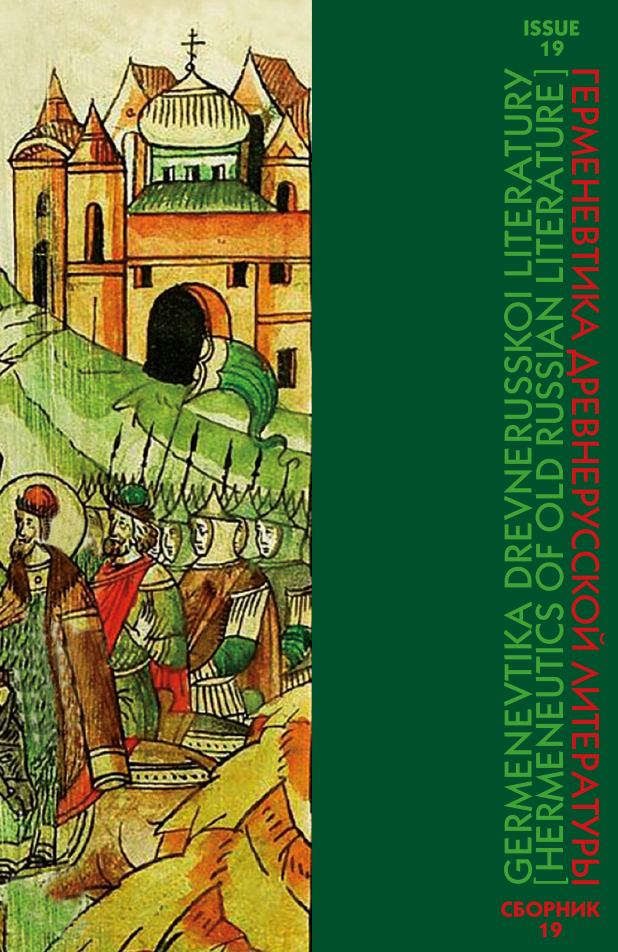Abstract:
The article examines a fragment from The Tale of the Blinding of Vasilko Terebovlsky — a story about the feelings of the Vladimir-Volyn prince David Igorevich before committing the atrocity he had conceived. The author divides the description of David’s emotional state into several parts, which are analyzed separately. It is based on the identification of literary parallels that are used to construct the story about the prince’s feelings. The identification of sources and related texts for the analyzed passage helps to understand the meaning of the description of the villain’s emotions. At first, the focus of the research is on the phrase “ne bѣ <…> glasa ni poslushan’ӕ” (“there was neither voice nor hearing”). Then the meaning of the verb “үzhasl”sѧ” (“was horrified”) and its role in the story of David’s feelings are explored. Here, in addition to identifying a literary parallel to the fragment, other examples from The Tale of Bygone Years containing words with the root “үzhas” (“horror”) are analyzed. The paper ends with the analysis of the mention of “lest’” (“flattery”), which David “imѣӕ v serdtsi” (“has in his heart”). The findings help to clarify how to understand the description of prince’s emotional state and what the function of the story in chronicle narrative is.
REFERENCES
1 Borisova, S.A. “The Fearful Paradise of ῾The Life of Basil the Younger’.” Studia Litterarum, vol. 7, no. 1, 2022, pp. 202–215. (In Russ.) https://doi.org/10.22455/2500-4247-2022-7-1-202-215
2 Danilevskii, I.N. Germenevticheskie osnovy izucheniia letopisnykh tekstov. Povest’ vremennykh let [Hermeneutical Foundations of the Study of Chronicle Texts. The Tale of Bygone Years]. St. Petersburg, Oleg Abyshko Publ., 2004. 448 p. (In Russian)
3 Demin, A. “Izobrazhenie ‘zverskosti’ zlodeev v drevnerusskoi literature” [“The Depicting of the Cruelty of Villains in Old Russian Literature”]. Razvitie lichnosti, no. 4, 2012, pp. 106–125. (In Russian)
4 Laushkin, A.V. “Nasledniki praottsa Izmaila i bibleiskaia mozaika v letopisnykh izvestiiakh o polovtsakh” [“The Heirs of the Forefather Ishmael and the Biblical Mosaic in the Chronicle Evidence of the Cumans”]. Drevniaia Rus’. Voprosy medievistiki, no. 4 (54), 2013, pp. 76–86. (In Russian)
5 Likhachev, D.S. Chelovek v literature Drevnei Rusi [Man in the Literature of Old Russia]. Moscow, Nauka Publ., 1970. 178 p. (In Russian)
6 Pautkin, A.A. Besedy s letopistsem: poetika rannego russkogo letopisaniia [The Conversations with the Chronicler: the Poetics of the Early Russian Chronicle]. Moscow, Moscow State University Publ., 2002. 286 p. (In Russian)
7 Ranchin, A.M. Vertograd Zlatoslovnyi: drevnerusskaia knizhnost’ v interpretatsiiakh, razborakh i kommentariiakh [Vertograd Zlatoslovny: Old Russian Book Culture in the Interpretations, Analyses and Comments]. Moscow, Novoe literaturnoe obozrenie Publ., 2007. 576 p. (In Russian)
8 Rudakov, V.N. “Drevnerusskie knizhniki o begstve kniazei ot tatar” [“Old Russian Scribes about the Flight of Princes from the Tatars”]. Drevniaia Rus’. Voprosy medievistiki, no. 1 (47), 2012, pp. 52–61. (In Russian)
9 Savel’ev, V.S. “‘Povest’ vremennykh let.’ Istochniki i sootnosimye teksty (Stat’ia 2)” [“‘The Tale of Bygone Years.’ Sources and Related Texts (Article 2)”]. Stephanos, no. 4, 2014, pp. 112–174. (In Russian)
10 Tvorogov, O.V. Leksicheskii sostav “Povesti vremennykh let” (slovoukazateli i chastotnyi slovnik) [The Lexical Structure of ‘The Tale of Bygone Years’ (the Word Pointers and Frequency Dictionary)]. Kiev, Naukova dumka Publ., 1984. 216, [1] p. (In Russian)






